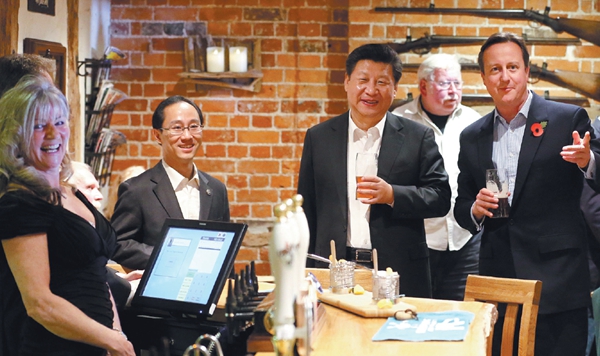UK visit showcases EU-China ties
Updated: 2015-10-24 09:17
By Luigi Gambardella(China Daily)
|
||||||||
 |
|
President Xi Jinping and Prime Minister David Cameron visit a pub in Princess Risborough, near Chequers, England, on Thursday. [PHOTO BY WU ZHIYI/CHINA DAILY] |
Strengthening the economic relations between the European Union and China is more important than ever at a time when the Chinese economy is slowing down and some EU members are struggling with austerity.
With Chinese President Xi Jinping visiting the UK, the UK government has talked about the start of a golden era in relations between the two countries. A variety of business deals totaling around 40 billion pounds ($62 billion) were signed between the two sides on Wednesday giving substance to those words. In fact, a recent report released by the Center for Economic and Business Research estimates that over 105 billion pounds of Chinese investments will flow into UK infrastructure - mainly transportation and nuclear energy - and real estate between now and 2025.
At the same time, the successive state visits of Xi to other European countries - last year he spent a total of 11 days in the Netherlands, France, Germany and Belgium - reflect the strategic position that the EU is playing in China's foreign and economic policy.
UK Prime Minister David Cameron together with German Chancellor Angela Merkel are perhaps the most forward-looking and practical government leaders in their approach to China.
Cameron's administration was the first government of a major Western country to have realized the importance of the Chinese-led Asian Infrastructure Investment Bank. The UK government has well understood the scope of Xi's Belt and Road Initiative and the enormous opportunities that this translates into for UK businesses, both within the UK's borders, for augmented inward investments from China, and beyond Europe, aimed at co-investments in infrastructure projects along the Silk Road Economic Belt and the 21st Century Maritime Silk Road.
Opportunities to realize such co-investments between Chinese and European players are substantial, thanks to the complementary expertise of the two sides. UK and European companies can contribute with their experience in areas such as project management, environmental protection, design and planning, while Chinese companies can bring in their excellence in engineering, infrastructure, and technology - a case in point being ZTE, which is heavily investing in 5G technology - and financial backing.
This winning formula should be exploited in both directions: the EU toward Asia and China, but also China toward the EU. Europe is the only developed region among the areas involved in the Belt and Road Initiative.
The Juncker Plan, now officially called the Investment Plan for Europe, can be an excellent catalyst for Chinese investments across the whole of the EU. Since the plan's introduction earlier this year, the EU has been the first to promote the convergence of China's interest in increasing its investments in Europe with Europe's goal to channel investments in critical economic sectors.
If today Chinese investors are principally targeting traditional fields such as transport, energy and real estate, that range of sectors will broaden in the near future. The Chinese government's national strategies China Manufacturing 2025 and Internet Plus, which target high tech manufacturing, smart logistics, e-commerce, big data, and fast broadband infrastructures, will help expand China-UK and China-EU cooperation and investments in the future.
The world of today is digital. Let us build a Digital Silk Road connecting Europe and China. If China and Europe managed to create a common cyberspace, they would put in place a market of 2 billion Internet users. A common digital market between Europe and China would require a series of actions, including among others the harmonization of Chinese and EU rules for online purchases for digital content, the harmonization of IP regimes, tax reduction, promotion of affordable parcel deliveries, and other things. But all these can be worked out to realize the potential of digital ties.
The author is president of ChinaEU, a non-profit platform aiming to boost bilateral digital cooperation.
- Global health entering new era: WHO chief
- Brazil's planning minister steps aside after recordings revelation
- Vietnam, US adopt joint statement on advancing comprehensive partnership
- European border closures 'inhumane': UN refugee agency
- Japan's foreign minister calls A-bombings extremely regrettable
- Fukushima impact unprecedented for oceans: US expert

 Stars of Lijiang River: Elderly brothers with white beards
Stars of Lijiang River: Elderly brothers with white beards
 Wealthy Chinese children paying money to learn British manners
Wealthy Chinese children paying money to learn British manners
 Military-style wedding: Fighter jets, grooms in dashing uniforms
Military-style wedding: Fighter jets, grooms in dashing uniforms
 Striking photos around the world: May 16 - May 22
Striking photos around the world: May 16 - May 22
 Robots help elderly in nursing home in east China
Robots help elderly in nursing home in east China
 Hanging in the air: Chongqing holds rescue drill
Hanging in the air: Chongqing holds rescue drill
 2.1-ton tofu finishes in two hours in central China
2.1-ton tofu finishes in two hours in central China
 Six things you may not know about Grain Buds
Six things you may not know about Grain Buds
Most Viewed
Editor's Picks

|

|

|

|

|

|
Today's Top News
Liang avoids jail in shooting death
China's finance minister addresses ratings downgrade
Duke alumni visit Chinese Embassy
Marriott unlikely to top Anbang offer for Starwood: Observers
Chinese biopharma debuts on Nasdaq
What ends Jeb Bush's White House hopes
Investigation for Nicolas's campaign
Will US-ASEAN meeting be good for region?
US Weekly

|

|







